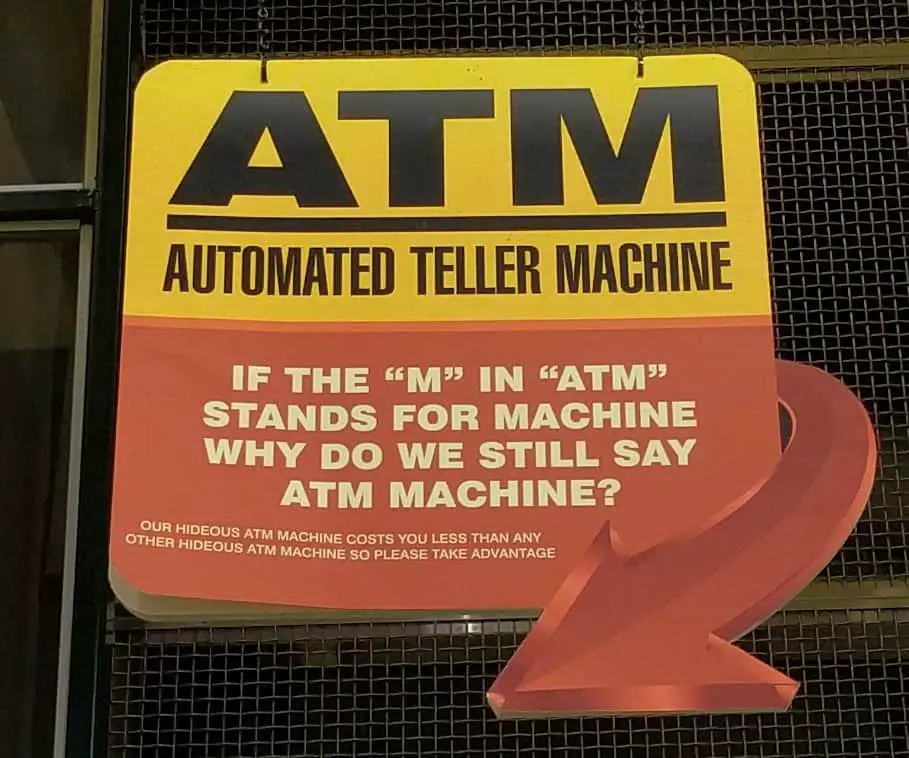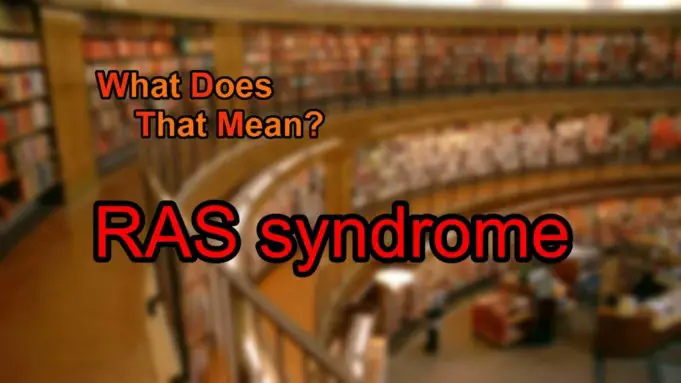RAS Syndrome, at first the term sounds like a medical disease to the ears. Although there is a disease medically known as RAS disease in children, the RAS we will be reading about is not a medical one of a sort.
It is more like a grammatical syndrome. The acronym RAS stands for “Redundant Acronym Syndrome.” Take a few seconds and consider a statement like this:
“At the celebrity gathering last month, Daniel went to the bank by 2 pm, made use of the ATM machine, inserted his card, smiled at the LCD display, entered his PIN number, and withdrew cash to pay for the RAS syndrome therapy I recommended for him.”
A perfect statement, Right!? Even the cops might not be able to find anything wrong with the information. But there is actually a flaw or rather flaws; redundant acronym syndrome might not be our serious everyday problem, but it is still a problem.
The term was coined in 2001 by ‘New Scientist’ blogger/writer Stanley Newman as a diagnosis for people who add an extra word to the end of a common acronym. For instance, “PIN number” (Personal Identification Number number), with this error, the whole phrase or even the sentence that employs its use becomes redundant and repetitive.
NB: Many people believe an acronym refers to a phrase shortened into words that are pronounced as words, such as “RADAR” and “NATO,” while an initialism is a phrase concise into the first letters of each word pronounced in the phase, such as ATM, BFF, NSAIDs, and FBI. But in this article, the acronym would be referring to both definitions.
Acronyms are always of great help. They provide great assistance, whether in making our writing more concise, fixing in more words in a chat, or even recalling a bulky name.
But they have become so common that many times, the official title and responsibility of a frequently used acronym look unseemly, causing us to take a second glance.
Sometimes, the use or presence of a word might not create a redundant phrase. For instance, “LASER (Light amplification by stimulated emission of Radiation) light” is light produced by a scientific process of light amplification.
Here are some frequently employed acronyms that often suffer from a redundant acronym syndrome:
ATM

“ATM machine” is one of the most common cases that suffer from RAS. However, giving that knowing ATM represents an “automated teller machine,” many individuals, including professionals and English doctors, still sometimes (un)consciously add an extra M (machine) to the acronym.
Acronyms exist to make living easier, though, and typing or saying out an extra “machine” only wastes your own time and energy.
BFF
I bet you might have read, seen, or even thought of the phrase “BFFs forever” or, even more deadly, “best BFFs forever” some persons even print these phrases on congratulatory cards.
Even a child of five knows what the acronym BFF stands for, yet many older folks still choose to tack on an extra “forever.” I cannot tell if the extra is to elaborate on the time or make it sound longer but forever is FOR-EVER, no longer.
Although this might be forgivable if you were my best friend, and many likely would not notice if you made this mistake. Still, an extra word is both unnecessary and grammatically incorrect. BFF stands for “Best friend forever”.
PIN, VIN, BVN, and SSN
If you notice, each of the above acronyms ends with the letter “N.” Each of the acronyms has the word “number” attached to it. Thus, phases such as “SSN number,” “PIN number,” “BVN number,” and “VIN number” are redundant, yet! They are used excessively, even by some corporate organizations.
So, the next situation an individual or cooperation asks for your “PIN/VIN/SSN/BVN number,” you might want to reconsider and want to give them such a piece of information, and if they are genuine. Beware of fraudsters and cybercriminals!
RSVP
The French language has a popular acronym, “RSVP,” many of us that have attended an official gathering, wedding invitation, anniversary, or birthday party have certainly come across this acronym.
You may not know that “RSVP” actually represents “répondez s’il Vous plaît,” which in translation means “please reply.” Very often, invitations state “please RSVP,” adding an extra “please.” Now it is a difference between not knowing it meaning and knowing but still making such error.
Now peradventure, the host wants to be extra polite or desperately needs the attendance of his guests, but more likely, “RSVP” has been incorrectly interpreted to mean “I hope you will be there.” Next time you want to dish out invitations, avoid a redundant acronym syndrome by simply saying “RSVP.”
POC
Generally, this acronym is different from other acronyms, in that individuals do not make the mistake of using “POC people” or “POC of color,” No, what mistake they frequently commit is the use of “POC” as an adjective when it is a noun.
Some common examples of this error are using “POC voters” and “POC students” when referring to voters of color and students of color. While “voters of color” and “voters who are POC” are grammatically correct, “people of color voters” are not.
This might not sound like a case of RAS but let us categorize this as a differential diagnosis of RAS (something presenting the same features but of different origin).
Unfortunately, the proper use of this acronym does not save time or space. However, the unintentional yet unnecessary use of two nouns in a phrase is redundant, opening a spot for this acronym on this list.
The RAS epidemic sweeping the country and other parts of the world might not be erasable, but it is preventable.
There are so many other acronyms subjected to RAS, such as;
- “LCD display” instead of “LCD.”
- “DC Comics” instead of “DC.”
- “PDF format” instead of “PDF.”
- “LA Angles” instead of “LA.”
- “ISBN number” when “ISBN” is the correct use.
- “RAS Syndrome” instead of just “RAS.”
- “SAT Test” instead of “SAT.”
- “PAC committee” instead of “PAC”
- “HIV virus” instead of “HIV”
- “CNN news” instead of “CNN”
- “CSS sheet” instead of “CSS”
- “OPEC countries” instead of “OPEC”
- “GOB Bluth” instead of “GOB”
- “NPR radio” instead of “NPR” and so many others.
But before a person uses an acronym next time, the meaning of what the letters stand for, avoid saying or typing extra words, will save time and chat characters.
And by preventing redundant acronym syndromes in your speech and correspondence, you might look smarter socially, in business, and in romantic situations.
Sources;
- Redundant Acronym Syndrome Syndrome; https://www.reddit.com/r/RASSyndrome
- RAS Syndrome; https://writingcooperative.com/are-you-suffering-from-ras-syndrome-e2c5ce39d3e4
- RAS Syndrome; https://www.npr.org/sections/memmos/2015/01/06/605393666/do-you-suffer-from-ras-syndrome












